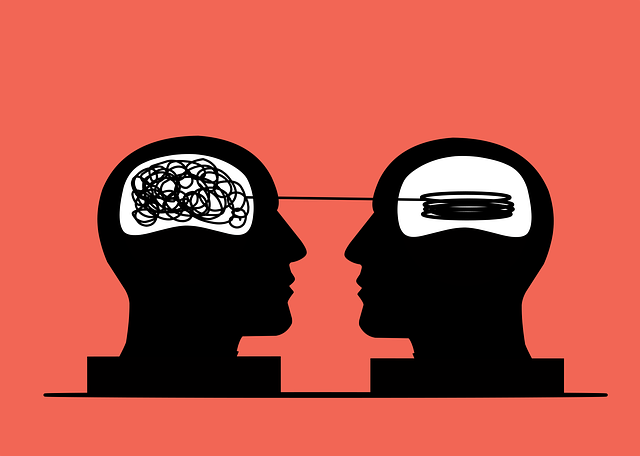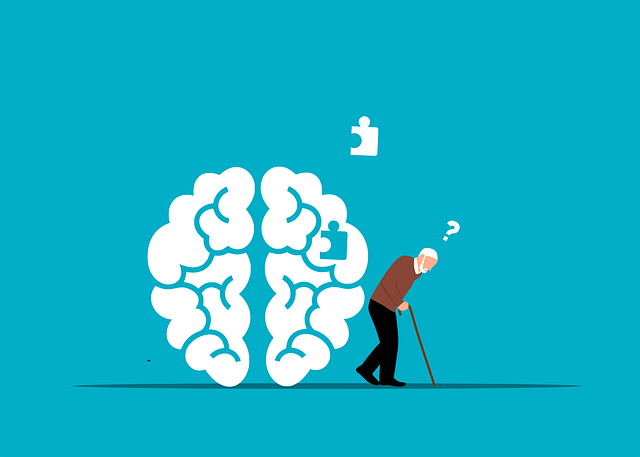Emotional Intelligence (EI) is a revolutionary approach in therapy for chronic pain, addressing both physical and psychological aspects. By focusing on self-awareness exercises, individuals gain insight into their emotional responses, preventing depression and managing symptoms effectively. EI enhances mental health awareness, enabling people to recognize and express feelings, thereby improving overall well-being and quality of life. Self-awareness helps in identifying triggers and managing pain through boundary setting and integrated health practices. Empathy, a key component of EI, allows individuals to connect more deeply with others, fostering support networks for emotional regulation. Regulatory strategies like mindfulness meditation, CBT, and ACT aid in coping with the mental impact of chronic pain, promoting positive thinking and confidence. Practicing mindfulness can significantly reduce medication reliance and improve quality of life, making it a valuable tool in public health awareness campaigns for proactive pain management.
Emotional intelligence (EI) is a game-changer in managing chronic pain, offering valuable tools for coping and enhancing overall well-being. This article delves into the profound impact of EI on chronic pain management, exploring key strategies such as self-awareness, empathy, emotional regulation, and mindfulness. By understanding and cultivating these skills, individuals can navigate their emotional landscape effectively, leading to improved pain tolerance and a better quality of life. Discover how EI transforms therapy for chronic pain, providing a holistic approach to relief.
- Understanding Emotional Intelligence and Its Impact on Chronic Pain Management
- The Role of Self-Awareness in Overcoming Chronic Pain
- Enhancing Empathy: Connecting with Others Through Emotional Intelligence
- Regulatory Strategies: Managing Emotions for Chronic Pain Relief
- Practicing Mindfulness: A Powerful Tool for Chronic Pain Therapy
Understanding Emotional Intelligence and Its Impact on Chronic Pain Management

Emotional intelligence (EI) refers to an individual’s ability to recognize, understand, and manage their own emotions, as well as recognize, understand, and influence the emotions of others. This concept has gained significant importance in various fields, including mental health and chronic pain management. For individuals dealing with chronic pain, EI can be a powerful tool for navigating the challenges they face daily.
By enhancing self-awareness exercises, people with chronic pain can better comprehend their emotional responses to physical discomfort. This heightened self-awareness allows them to address underlying depression prevention and manage symptoms more effectively. Mental health awareness is also enhanced when individuals develop skills to recognize and express their feelings, thereby improving their overall well-being and quality of life. In therapy for chronic pain, integrating emotional intelligence can revolutionize the approach to treatment, offering a holistic solution that addresses both physical and psychological aspects of pain management.
The Role of Self-Awareness in Overcoming Chronic Pain

Self-awareness is a powerful tool in the journey towards overcoming chronic pain. It involves understanding and recognizing one’s emotions, thoughts, and physical sensations without judgment. In the context of therapy for chronic pain, this means learning to identify when pain flares up and what triggers it—be it stress, certain activities, or specific thoughts. By cultivating self-awareness, individuals can begin to unpick the complex relationship between their mind and body, which is often at the heart of chronic pain conditions.
This process facilitates emotional healing and can prevent burnout, a common issue for those managing long-term pain. With improved self-awareness, individuals become better equipped to manage their symptoms through various strategies. They learn to set boundaries, make adjustments to their daily routines, and develop coping mechanisms that integrate physical and mental health practices. Moreover, enhanced self-understanding enables people to communicate their needs effectively to healthcare providers, contributing to effective risk management planning for mental health professionals treating them.
Enhancing Empathy: Connecting with Others Through Emotional Intelligence

Empathy is a cornerstone of emotional intelligence that involves understanding and sharing the feelings of others. Enhancing this skill can profoundly impact individuals dealing with chronic pain, as it offers an alternative path to navigate difficult emotions often associated with such conditions. By practicing empathy, people experiencing pain can connect more deeply with themselves and those around them, fostering support networks that are crucial for emotional regulation.
This ability is particularly beneficial in therapy sessions for chronic pain, where heightened emotional awareness can facilitate effective communication. It helps therapists understand the unique emotional landscape of their patients, allowing for tailored strategies to manage anxiety relief and improve overall well-being. Emotional intelligence, thus, serves as a powerful tool not just for coping with physical discomfort but also for cultivating meaningful relationships and enhancing one’s mental resilience.
Regulatory Strategies: Managing Emotions for Chronic Pain Relief

Regulatory strategies play a pivotal role in managing emotions and can be particularly beneficial for individuals grappling with chronic pain. Therapy for chronic pain often involves learning to regulate emotional responses, as intense or prolonged discomfort can significantly impact mental well-being. Techniques such as mindfulness meditation, cognitive behavioral therapy (CBT), and acceptance and commitment therapy (ACT) empower individuals to develop a healthier relationship with their emotions.
By fostering positive thinking and confidence boosting techniques, these therapies help patients manage stress and anxiety associated with chronic pain. Moreover, risk management planning for mental health professionals can be tailored to address the unique emotional challenges posed by persistent pain, offering valuable tools for coping and resilience. This proactive approach not only enhances overall well-being but also contributes to more effective therapy for chronic pain management.
Practicing Mindfulness: A Powerful Tool for Chronic Pain Therapy

Practicing mindfulness has emerged as a powerful tool in the therapy for chronic pain, offering individuals a way to navigate and manage their persistent discomfort with enhanced mental wellness. This ancient practice encourages individuals to focus on the present moment, cultivating awareness of physical sensations, thoughts, and emotions without judgment. By training the mind to observe rather than react, mindfulness becomes an effective strategy to reduce stress and anxiety associated with chronic pain conditions.
Incorporating mindfulness into daily routines can significantly impact public health awareness campaigns focused on mental health. These practices promote self-care and coping mechanisms, empowering individuals to take a proactive role in managing their pain. With regular practice, mindfulness enhances mental health awareness, enabling people to better understand and regulate their emotional responses, ultimately leading to improved quality of life and reduced reliance on certain medications for pain management.
Emotional intelligence (EI) plays a pivotal role in managing and overcoming chronic pain. By cultivating self-awareness, empathy, and mindfulness, individuals can significantly enhance their therapy for chronic pain. Understanding and regulating emotions effectively not only improves quality of life but also fosters better connections with others, ultimately providing lasting relief from chronic pain.












